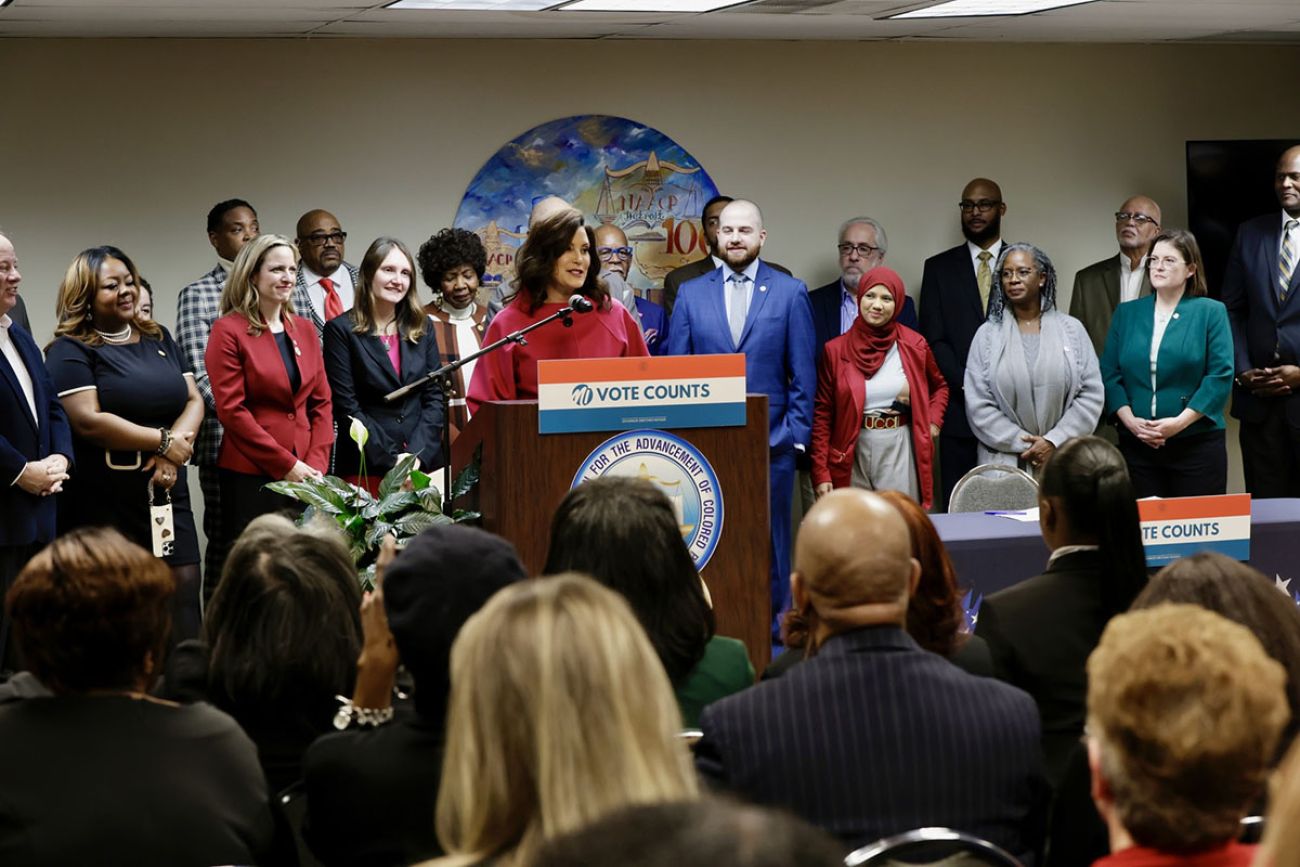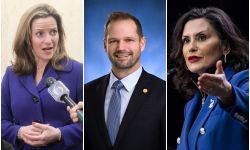Whitmer signs Michigan election law overhaul that aims to prevent ‘chaos’

- Michigan Gov. Gretchen Whitmer signs sweeping election-related bills
- New laws reform post-election certification process in an attempt to ‘ward off chaos’ seen in 2020
- Other laws expand voter registration, create criminal penalties for intimidating election workers and regulate artificial intelligence ads
LANSING — Michigan Gov. Gretchen Whitmer on Thursday signed into law a sweeping series of election bills that supporters contend will boost democratic participation and prevent "chaos" in the event of disputed elections.
Among other things, the new laws expand voter registration, criminalize poll worker intimidation, regulate political ads that use artificial intelligence and tighten the election certification process that former President Donald Trump tried to disrupt following his 2020 loss.
“In Michigan, we are proving through our actions that we stand for fundamental American values of freedom and democracy,” Whitmer said in a signing ceremony at the headquarters of the NAACP’s Detroit branch, where she was joined by local leaders and voting rights advocates from across the state.
The new laws are the latest in a series of election reforms from Democrats in Lansing, who this year took full control of state government for the first time in four decades. Whitmer in July signed bills to implement an early voting ballot initiative and earlier this month lifted a long-standing ban on paying to give voters rides to polls.
While Republican leaders did not immediately respond to requests for comment Thursday, GOP lawmakers almost uniformly opposed the changes, arguing they could compromise election security and increase administrative costs for both the state and for local election clerks.
The new voter registration law, for instance, may necessitate government technology upgrades and requires the state to send opt-out notices to citizens who will now be automatically registered to vote when they apply for a driver's license or Medicaid benefits, or when they’re released from prison.
Michigan already has one of the highest voter registration rates in the country, but sponsoring Rep. Penelope Tsernoglou, D-East Lansing, has called her bills the “next step” toward ensuring “that every citizen has the opportunity to vote.”
Another law Whitmer signed Thursday will allow 16-year-olds to pre-register to vote so that they are prepared to cast a ballot when they are eligible at 18.
“Trust me, we will be letting them know exactly how to exercise their options to vote in every election via voting early or voting in-person on Election Day,” Secretary of State Jocelyn Benson, a fellow Democrat, said during what she called the “historic” bill-signing ceremony.
Benson also praised a new law that will make it a crime to intimidate or otherwise threaten election workers in an attempt to stop them from performing their duties. Penalties would start at 93 days in jail and up to a $500 fine for a first offense.
"We are here to protect the people who protect democracy," Benson said, arguing the recent escalation of election worker intimidation is the result of "misinformation that has wrongly flowed into our democracy for far too long."
Another of the bills Whitmer signed Thursday will attempt to regulate a new frontier of political misinformation. It will require disclaimers on political “deepfakes” and campaign ads created using artificial intelligence. Violators would be subject to fines of between $250 and $1,000.
‘Crazed and debunked legal theories’
The new law governing election certification aligns Michigan with the federal Electoral Count Reform Act, which was introduced in Congress with a handful of GOP co-sponsors and signed last year by Democratic President Joe Biden.
Among other things, the federal law makes clear that the vice president has a “ministerial” duty to count electoral votes that states send to congress, contradicting Trump’s claim that former Vice President Mike Pence could and should have blocked certification of the 2020 presidential election.
The new Michigan law similarly states that partisan election canvassers at both the county and state levels have a "ministerial, clerical, and nondiscretionary duty" to certify results based on results compiled by local clerks.
In 2020, Trump personally called Republicans on the Wayne County Board of Canvassers, who subsequently attempted to rescind their certification votes. Trump also pressured Republican state canvassers, including one who nonetheless voted to certify Biden’s 154,188-vote Michigan victory.
The Michigan measure also speeds up the timeline for completing the post-election canvass and clarifies that only the governor can submit a list of presidential electors to congress. That’s an attempt to limit confusion over alternate or false elector slates like the kind Trump’s campaign organized in 2020, including in Michigan, where several Republicans are now fighting related criminal charges.
The changes will “remove ambiguity and ensure courts are the primary venue for contested elections,” Kevin Johnson, co-founder of the national Election Reformers Network, told lawmakers last month in a legislative hearing.
The law will also give legislative leaders the ability to nominate individuals to fill vacancies on the bipartisan Board of State Canvassers, a task previously reserved for the leaders of each major political party. Sponsoring Sen. Jeremy Moss, D-Southfield, has acknowledged that change will minimize the role of Michigan Republican Party Chair Kristina Karamo, a 2020 election denier who refused to concede her 14-point loss in the 2022 Secretary of State race.
Under the new law, the Michigan GOP chair will still be able to nominate three candidates the next time a Republican seat is vacated on the four-member board of state canvassers. But GOP leaders in the House and Senate will also be able to nominate one person each, and the governor will then pick from those five.
The Michigan law builds on last year’s federal legislation to “ward off chaos in future elections,” Moss said last month in committee testimony.
Trump’s “lies” in the 2020 election cycle “targeted Detroit,” and his supporters “tried to throw out votes primarily from Black citizens,” Moss added Thursday, drawing applause from NAACP Detroit President Wendell Anthony.
The new laws will create a “clear process, free from illegal obstruction, to certify the 2024 election,” Moss said. “No more crazed and debunked legal theories about how electors can convene, how our electoral college votes are sent to congress, and no more fake slates.”
See what new members are saying about why they donated to Bridge Michigan:
- “In order for this information to be accurate and unbiased it must be underwritten by its readers, not by special interests.” - Larry S.
- “Not many other media sources report on the topics Bridge does.” - Susan B.
- “Your journalism is outstanding and rare these days.” - Mark S.
If you want to ensure the future of nonpartisan, nonprofit Michigan journalism, please become a member today. You, too, will be asked why you donated and maybe we'll feature your quote next time!




